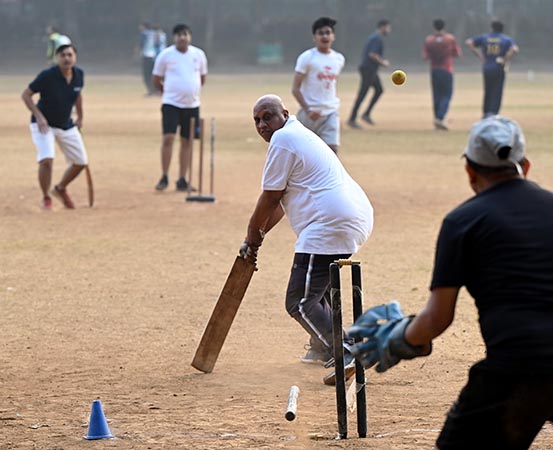
The search for the elixir, or rather elixirs, to arrest or delay ageing has been on since eternity. Science has come a long way in understanding ageing, right to the chromosomal level. While research is on to develop rejuvenation biotechnologies that would address ageing by managing the cellular and molecular damages caused by it, exercise remains the best bet in the pursuit of healthy ageing.
However, there is a difference between ageing healthily and delaying ageing. Happiest Health busts a few myths with the help of researchers and experts from around the world.
Myth 1: Physical activity delays the ageing process
“Despite what is almost always said, physical activity actually doesn’t help delay ageing,” says Michael Rae, science writer at SENS Research Foundation (Strategies for Engineered Negligible Senescence), California, USA. “Instead, exercise builds up more physiological capacity and reserve such that when ageing processes take hold, you retain more functional capacity than a similar-aged person — even though the age-related declines are the same.”
Rae, co-author of the book Ending Aging, explains this idea with an interesting analogy. “Consider inflation,” he says. “A large savings account is a good thing to have when inflation hits, because it means you have some cushion to absorb the increase in prices. But the increase in prices is occurring to your purchases, just as they are to everyone else.”
“In some studies, in fact, the actual rate of decline in physical performance happens faster in people who exercise than people who don’t: they’re able to maintain higher performance in the face of this faster decline because of the extra functional reserve.”
Muscle atrophy (loss of muscle mass) is inevitable with advancing age. Despite that, elite athletes who maintain an active lifestyle age gracefully with fewer health problems than those who lapsed into inactivity, reported a 2008 research.
So, “although exercise doesn’t slow down the accumulation of most forms of cellular and molecular damage in the structure and unit-by-unit function of that muscle, exercise can increase the size and strength in surviving, functional muscle fibres,” says Rae.
Myth 2: Ageing can be measured with age clocks, age calculators, biomarkers
While wearables that monitor workouts and body vitals are in vogue now, age calculators and clocks that determine how much of an influence exercise has on ageing might be the next big thing. However, a technology that can tell you your biological age based on body vitals or a blood test is not yet available.
“It’s not very clear we have good biomarkers of ageing for individuals at present,” says Rae.
In recent times, ageing research has garnered a lot of excitement due to age clocks, and specifically epigenetic age clocks — mathematically derived age estimators that are widely used to measure the age of tissues and cells, based on age-related chemical changes in specific areas of their genomes.
“While a number of such clocks have been demonstrated to be fairly robust in assessing unmodified ageing, it’s not at all clear yet that they accurately reflect changes in the trajectory of ageing in response to interventions [say, exercise] — or that they do so uniformly,” says Rae.
Furthermore, these clocks encounter a high degree of technical noise [deviations] for the same blood sample. The use of computational tools has brought down this range of deviation to just under 1.5 years, resulting in better epigenetic clocks, says Rae. Yet, it will be a while before the algorithm is made available commercially to calculate biological age.
Myth 3: Exercise slows down telomere attrition, thereby delaying ageing
“Telomeres are little protective covers at the ends of our chromosomes,” says Dr Amit Sharma, group leader, ImmunoSENS, SENS Research Foundation. “Every time a cell in our body divides as we age, [telomeres] become shorter and shorter, and there is no way to stop this process. No medicine till now has been shown to work in repairing telomeres. The fact that regular exercise can slow the damage is very interesting.”
However, “we don’t quite know how this happens still, but it might be due to lowering of oxidative agents in the cells that can damage the cells. It can also be by improving function of DNA repair enzymes”, adds Dr Sharma.
Though exercise may slow down the loss of telomeres, Rae says, “Neither exercise itself nor exercise’s effects on telomere attrition affect the rate of ageing.”
The future of ageing
“To set us free from ageing, we need a new platform of biomedicines, based on the application of the principles of regenerative medicine to the structure of the body at all levels: from organs and tissues to cells and down to the molecular structures within and surrounding them,” says Rae.
“These rejuvenation biotechnologies are therapies that directly remove, repair, replace or render harmless the cellular and molecular damage wrought in our tissues by the biological ageing process. It is this damage that slowly impairs the tissues of our bodies as it accumulates over time, resulting in the progressive rise in frailty, disease, disability and death that people now suffer with age. By clearing out that damage, functionality can be restored and youthful health and vigour with it.”
Should you exercise or not?
Yes, you must. Exercise certainly cannot reverse the ageing process, but it does reduce many of its harmful systemic and cellular effects, according to an elaborate 2015 review.
Rae agrees. “It is a very good idea to exercise and live a healthy lifestyle in order to prevent needless and premature suffering with age-related disease and debility,” he says.
Takeaways
- Physical activity doesn’t help delay ageing. But exercise does build up more physiological capacity and reserve so that you retain more functional capacity than a similar-aged person with similar age-related decline.
- Exercise cannot reverse the ageing process, but it reduces many of its systemic and cellular effects.
- Rejuvenation biotechnologies are therapies that directly remove, repair or replace the cellular and molecular damage due to the biological ageing process.

















